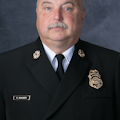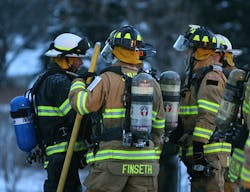14 Competencies for Your Climb on the Fire Service Career Ladder
Are you a competent firefighter, EMS provider or fire officer? Let’s assume that you are. How did you acquire this competence and how long did it take? Did you make any mistakes along the way? And what about when you changed an assignment or were promoted – how did you acquire the new skills and knowledge necessary to perform these new roles? Considering the answers to these questions will be important as we outline the role that higher education plays in developing administrative competence.
Before we get started, let’s agree on a few important points. The first is that we will not spend much time justifying the need for higher education for chief officers or those of you who are on that career path – accept that having a degree is a job requirement. We will also not be debating the value and relevance of college coursework versus technical training classes – it’s better to agree that they are different approaches to acquiring different kinds of skill sets and knowledge. And finally, don’t get distracted by “book” smarts versus “street” smarts – in today's fire services you need a full measure of both.
Knowledge Needs Change
Not all jobs in the fire service are the same and therefore the types of knowledge and skills required to perform each job varies. A simple example is seen in the differences between engine and ladder or truck work, some skills of these companies are the same while others require a different way of thinking and variation in skills and knowledge. This becomes even more apparent at the first promotion and with each progression in rank demanding the acquisition of new knowledge and skills. Ideally, each fire service assignment or promotion prepares a fire officer for the next role, but from my experience this is rarely the case.
Learning to manage and supervise others in firefighting and emergency services activities is generally the prime objective of company-level officer development. Shift and support-level officer positions are tasked with supervising and supporting operations or a bureau assignment such as inspections or training. While administrative officers are responsible for preparing budgets, setting organizational policy, and planning and implementing community fire and EMS delivery services programs just to name a few. The differences between these fire service roles and the skills and knowledge required to perform them are profoundly different. And as a result, the way in which we acquire these for each rank are also necessarily different.
Let’s revisit the questions posed at the beginning of this article. As the result of my own experiences and observations, firefighters are probably not going to become proficient at firefighting by sitting in the classroom. Firefighters and officers need first-hand experiences if they are going to become proficient at advancing and operating hoselines or recognizing changing smoke conditions. Inexperienced firefighters and officers are surrounded and supported by more experienced firefighters and officers while acquiring competence on the training ground or fireground. And although there are risks with this learning approach, these are highly structured and organized work environments inherently designed to protect firefighters. Ultimately, firefighters will spend decades acquiring the competence necessary to adjust to each new role, assignment or promotion.
Chief officers, on the other hand, operate in a different environment altogether where learning-as-you-go is not necessarily the best option and can actually jeopardize their professional credibility and ability to effectively lead and manage their department. No longer are there support mechanisms in place like experienced peer officers who give feedback and excuse mistakes, the work environment is unlike anything experienced on the fireground or fire station and the skills and knowledge gained up to this point do not match job demands. Simply put, the administrative environment is not safe for chiefs who lack the administrative skills and knowledge to perform independently on day one – and unlike firefighting skills, the college classroom is a better place to safely develop administrative competency.
In a recent Firehouse webcast, I discussed some of the most obvious competencies required of chief officers that are best obtained through degree work. This is a partial list and may not apply to every department. They are not in any particular order and are not likely found within a single degree program – but that really isn’t the point. The point is training and experience alone isn’t likely enough to close the gaps on these competencies. They include:
- Possessing a working knowledge of contemporary fire service issues including community fire protection and emergency services delivery approaches, fire prevention practices, firefighter safety and risk management and labor/staff relations
- Preparing and managing financial reports and multi-year budgets, tracking revenue and expenses, evaluating fiscal performance and trends and making operating decisions based on financial capability
- Administrating firefighter and fire officer selection, promotional, onboarding, and appointment policies, practices and processes
- Collecting and using response data, performance measures, community and organizational data to support decisions and to support planning
- Administrating organizational knowledge and developing systems and processes to develop firefighters and officers and to support learning across the organization
- Conducting comprehensive department strategic planning linked to community needs and goals
- Reviewing, approving, or preparing technical documents and specifications, departmental policies, standard operating procedures and other formal internal communications
- Planning and implementing services delivery, preparing and presenting proposals for tax increases and other major initiatives with community stakeholders including citizens, elected officials, town administrators, finance officers and fire department staff
- Defending fire department decisions, actions and errors to a legal authority, elected official, citizen stakeholders, labor or association members and others
- Improving organizational performance through process improvement and best practices initiatives
- Recognizing and responding to local, regional and national trends, changes and pressures
- Providing leadership and direction to the organization, delegating responsibility and authority and managing change processes
- Communicating and negotiating effectively with elected officials, citizens, labor groups or associations and other professionals
- Having a working knowledge of information management and technology systems
Consequences For The Unprepared
There are plenty of examples within the fire services that illustrate the consequences if we fail to properly prepare ourselves to assume these roles. The fire services have never been more publicly accountable for their actions, or inactions in some cases, and today we see more evidence that citizens, elected officials and community leaders, and even our own firefighters are becoming less tolerant and forgiving of incompetence. Our goal as firefighters and fire officers is to leave situations better than we found them and this requires a high degree of expertise.
This applies on the emergency scene, within the fire station and across the fire department. Every community is dependent on highly proficient jumpseat firefighters and front seat fire officers. And every fire department is dependent on chief fire officers who have the administrative skills, knowledge and abilities to perform their respective duties.
If you are a firefighter, master your firefighting skills – train, drill and learn as much as you possibly can from others and constantly strive to get better. And if you think you are going to move up the ranks, prepare yourself now for going to college in the future. If you are a fire officer, you should already be considering, currently attending, or have completed a degree program.
FREDERICK KAUSER is the deputy fire chief for the Mifflin Township Division of Fire, located in metropolitan Columbus, Ohio, where he has worked for 30 years. The 100-member career fire department responds to approximately 8,600 incidents annually. Chief Kauser has an associates and bachelors degree in Fire Science, a masters in Labor and Human Resource Management and is a PhD candidate completing his dissertation in Workforce Development and Education at the Ohio State University. He is an adjunct professor at Franklin University and an academic program advisor for Franklin University and the Columbus State Community College. Kauser is an advocate of higher education and lectures on a variety of higher education and leadership topics in the fire service.
About the Author

Frederick Kauser
Frederick Kauser retired as the fire chief for the Mifflin Township, OH, Division of Fire, where he worked for 40 years. The 100-member career fire department responds to approximately 11,000 incidents annually. Kauser has an associate degree and a bachelor's degree in fire science, a master's degree in labor and human resource management and a PhD from the College of Education and Human Ecology at The Ohio State University. He is a fire instructor, lecturer, trainer, professor, and researcher in social and cognitive learning. Kauser teaches and lectures on a variety of training and higher education topics in the fire service.
